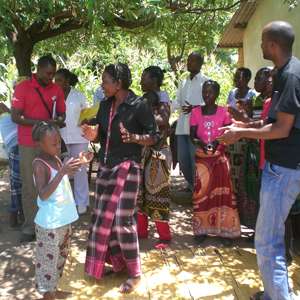Dealing with HIV as a chronic disease in Africa

Since 2004, the number of patients on antiretroviral drugs in Sub-Saharan Africa has increased 24 times, to 6.9 million*. HIV has become a chronic disease. A lifelong strict adherence to treatment is necessary. Health systems in Southern Africa are not equipped to maintain an unprecedented large number of patients in life-long treatment. Alternatives are therefore urgently needed. ITM researcher Freya Rasschaert explored innovative solutions that take the needs of patients and the local reality into account. Rasschaert will receive a doctorate on Friday (March 28) at the Vrije Universiteit Brussel for her research in Ethiopia, Malawi, Mozambique and Zimbabwe.
In order to facilitate access to lifelong antiretroviral therapy (ART), care services were decentralized in these countries to peripheral health centres. Many of these peripheral centres are not equipped or adapted to this extra work pressure and to deal with the number of additional patients, however. Malawi and Ethiopia are two examples of how this deficiency can be addressed by delegating tasks to lower health frameworks and by creating new functions dedicated to HIV care without compromising the quality of the care.
Despite the contribution of enhanced health structures to improve access to ART and better retention of patients, this approach remains insufficient: "As long as a patient is sick, a health centre remains the preferred place for treatment, but you can't expect a fit HIV patient on ART to travel for two to three hours ever month just to fetch his or her pills. Furthermore, all peripheral health centres will be overcrowded and saturated within a short amount of time," says Rasschaert.
According to Rasschaert, treatment models of other chronic diseases, with the emphasis on 'self-management', can be applied to HIV care. Health care providers then no longer carry the major responsibility, but are mainly involved in teaching the necessary skills and knowledge to help patients cope with their disease themselves and to accompany them during this process. "This way people with HIV actively participate in the care of their chronic illness and at the same time it reduces the work pressure in the health centres, providing more time for the health staff to deal with the acutely ill."
Most of the chronic care models in developed countries can count on the support of strong health systems and multidisciplinary teams, which is rarely the case in countries with limited resources. That is why other support mechanisms, such as 'peer support' and social engagement, are so important.
The community-based treatment model in Tete, Mozambique, is a good example of how patients can play an active role in their own care and the care of fellow sufferers. Groups formed by patients stable on ART ensure monthly access to antiretroviral drugs through a rotating medication retrieval system. They also offer support in the therapy adherence and a protected environment in which patients can freely discuss their daily problems and challenges.
"People with HIV and the community around them can play an important role in keeping people in treatment, but that's no excuse not to tackle the health system's problems. Stronger health systems and innovative patient-centered care should go hand in hand with lifelong HIV care," concludes Rasschaert.
Rasschaert made use of literature studies, analysis of routine data, retrospective cohort analyses and qualitative research methods to come to her conclusions.


















